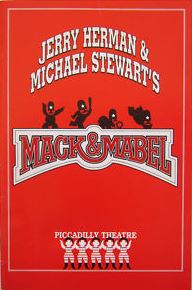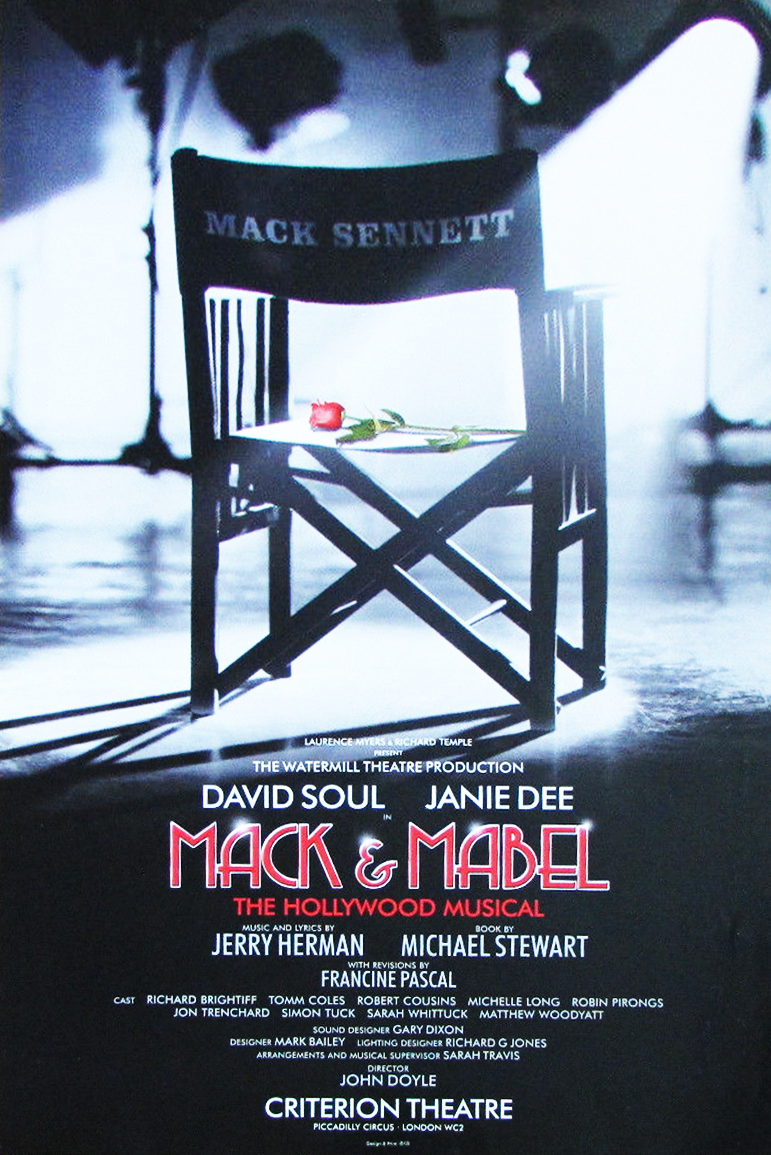Mack and Mabel
Musical (1974)

Ed Lester, the director of the Los Angeles Civic Light Opera, suggested the project to Jerry Herman, who then involved Michael Stewart. David Merrick agreed to produce, and Gower Champion was engaged to direct and choreograph. Although Champion had initially declined the offer, he eventually accepted, especially when it was decided to hold the pre-Broadway tryouts in California. Robert Preston was hired as Mack. For the role of Mabel, several actresses were engaged and then let go, including Marcia Rodd and Kelly Garrett, before the young Bernadette Peters finally joined the cast.
Pre-Broadway tryouts
Mack & Mabel opened in pre-Broadway tryouts in San Diego on June 17, 1974[2] and then Los Angeles, with brisk box office sales in both cities. According to The New York Times, " 'Mack and Mabel' has been doing rather better than its probable guarantee [in Los Angeles] – up to $150,000 in its final seven-day period." The musical received reviews that ranged "from fair to phenomenal in San Diego, Los Angeles, and St. Louis". The Los Angeles reviews were "encouraging but guarded", and warned "of the excessive comic sequences, uneven book, and, most especially, the dark ending." Buoyed by the critical response and initial public enthusiasm for the show, Herman and company ignored a number of warning signs. Neither Sennett nor Normand was a particularly lovable character, and their story was darker than that usually found in a musical. Preston (as Sennett) was too old for Peters (Mabel), and their characters lacked chemistry. Champion devised a number of eye-catching visual effects and spectacular dance sequences set to Philip J. Lang's orchestrations, but their brightness proved to be too great a contrast with the somber mood of the piece. His concept of setting the action in the corner of a huge studio soundstage created problems with the set and limited the staging to the extent that it was seen as static and boring. Audiences "were not ready for a down-beat saga about a cocaine-sniffing movie queen."
Efforts were made to resolve the problems at The Muny in St. Louis, where the musical ran for one week starting August 19, 1974, but this venue was a "terrible mistake". Because The Muny was so large, the performers overplayed and pulled the show out of shape. By the Washington, D.C. Kennedy Center engagement, "nothing was working", and Champion changed the staging of scenes that had previously worked. Richard Coe in his The Washington Post review stated that it had landed at the Kennedy Center "with all the zip of a wet, very dead flounder."
Broadway
The musical opened at the Majestic Theatre on Broadway on October 6, 1974, and closed on November 30, 1974 after 66 performances and 6 previews. Scenic design was by Robin Wagner, costume design by Patricia Zipprodt, and lighting design by Tharon Musser. In addition to Preston and Peters, the cast featured Lisa Kirk as Lottie Ames and James Mitchell as William Desmond Taylor.
Despite only fair reviews and the short run, the show received eight Tony Award nominations: for Best Musical, the book, direction, choreography, lead actor, lead actress and designs but did not win any. Herman, whose melodic score had received the best notices, was not nominated. He was deeply disappointed, since the project had been one of his favorites (and remains so), and he felt producer David Merrick had done little to promote it, saying "He never invested in advertising. He never came to the theatre." Despite its failure, the show has developed a cult following.
Mack and Mabel deals with the complex relationship between Max Sennet, a temperamental, workaholic film director and Mabel Normand, a waitress who became one of his biggest stars. In a series of flashbacks, Sennett recalls the time he discovered Mabel back in 1911, her rise to stardom, their love affair, when she leaves him to work for the “serious” director W.D. Taylor and finally, her tragic death from a heroine overdose. In the end, Sennet creates his own happy ending plotting a scene in which he and Mabel marry.
Afficher le synopsis détaillé
Act I
Silent movie director Mack Sennett returns to his old film studio in Brooklyn in 1938. Things have changed considerably since he was last there—he sees a group of actors shooting a scene for a talkie. Mack reminisces about "when he ran the show", the glorious era of silent movies, thinking of his Bathing Beauties and Keystone Cops ("Movies Were Movies").
In a flashback, it is 1911. When Mabel, a delicatessen worker, delivers a sandwich to Lottie, the actress that Mack is filming, Lottie is unable to pay, and Mabel reacts violently. Mabel's dramatic behaviour catches Mack's eye, and he thinks she has potential as an actress. He offers her a part in his next film. She initially refuses, but when she looks back on the offer, she is dazzled by the career prospects ("Look What Happened To Mabel").
Mabel is very successful and becomes a major star. Later, along with Mack's two accountants, Kleiman and Fox, who are helping to finance his projects, the film company moves to a new, larger studio. Lottie and the rest of Mack's film crew, who include the comedian Fatty Arbuckle, eagerly fantasize about moving up in the world, ("Big Time"). Meanwhile, Mabel has become attracted to Mack. While she is reciting an improvised poem, Mabel invites him into her train compartment for a meal. Things escalate, and Mabel persuades a very reluctant Mack to take part in a mock wedding ceremony. But Mack has no time for romance ("I Won't Send Roses"). He and Mabel sleep together, but Mack wakes up horrified and leaves in a hurry. Mabel, now in love with Mack, resolves to do things his way ("I Won't Send Roses" (Reprise)).
Eventually, Mabel wants to move on from comedy and star in serious dramas. But Mack is only interested in comedy ("I Wanna Make The World Laugh") and tries to discourage her. Mabel meets another movie director, the smooth-talking William Desmond Taylor, who is instantly attracted to her, and agrees to feature her in serious films - he invites her to dinner to discuss arrangements. Mack tries in vain to discourage her. After an argument, Mabel dresses in her best clothes and puts on make-up, then goes off not only for her appointment with Taylor, but for good, as she never wants to see Mack again ("Wherever He Ain't"). Mack is confident that he can manage without Mabel: he made a star out of one ordinary girl, and he can make a star out of another. With this in mind, he immediately comes up with the concept of the Bathing Beauties ("Hundreds of Girls").
Act II
Mabel eventually returns to Mack of her own accord and is welcomed with open arms by the entire film company ("When Mabel Comes In The Room"). Mack is so glad to have her back that he agrees to film Mabel's new, serious drama, "Molly", at his studio. But he can't help himself - comedy is his nature. He attempts to jazz it up with a new comic creation, The Keystone Cops ("My Heart Leaps Up"), and Mabel returns to Taylor. Later, Mack sees Mabel again as she is preparing to embark on a ship with Taylor. Taylor shows up and Mack leaves. Taylor, sensing that Mabel might still have feelings for Mack, persuades Mabel, who is complaining of tiredness, to take heroin, saying it is a pick-me-up, which works with the magic words, "Bye, Mack!". Mabel is heartbroken by everything Mack has done to her, but is confident that she will eventually forget him ("Time Heals Everything").
Back at the studio, a happy Mack has realized the potential of sound in his movies, with singing and dancing. Lottie Ames, another actress in Mack's company, has become a star, but Mabel has become a full-time drug addict ("Tap Your Troubles Away"), and her reputation is ruined. To add further to the tragedy, her lover, William Desmond Taylor, is murdered, and she is the prime suspect. By the time Mack is willing to try to patch things up between him and Mabel, it is too late - she has died. But musicals must end happily, so Mack imagines a happier ending to their story ("I Promise You A Happy Ending").
Act I
Overture - Orchestra
Movies Were Movies - Mack
Look What Happened to Mabel - Mabel and Company
Big Time - Lottie Ames and Company
I Won't Send Roses - Mack and Mabel
I Wanna Make the World Laugh - Mack and Company
Wherever He Ain't - Mabel
Hundreds of Girls - Mack and Bathing Beauties
Act II
When Mabel Comes In the Room - Company
My Heart Leaps Up/Hit 'em on the Head - Mack
Time Heals Everything - Mabel
Tap Your Troubles Away - Lottie and Company
I Promise You a Happy Ending - Mack
Mack Sennett — A workaholic movie director
Mabel Normand — A deli delivery girl who becomes a movie star. Mack reluctantly becomes romantically involved with her.
William Desmond Taylor — A "serious" director, and rival for both Mabel's acting talents and her affections
Kleiman — An accountant
Fox — Kleiman's partner
Frank Wyman — An actor/writer, and later a director
Lottie Ames — A silent movie star
Subsequent revisions of the show have changed some character names to their real life counterparts from the era.
Frank Wyman - Frank Capra
Fatty - Roscoe "Fatty" Arbuckle
Kleiman - Adam Kessell
Fox - Charles O. Bauman
Aucun dossier informatif complémentaire concernant Mack and Mabel
Aucun dossier informatif complémentaire concernant Mack and Mabel

Version 1
Mack & Mabel (1974-10-Majestic Theatre-Broadway)
Type de série: OriginalThéâtre: Majestic Theatre (Broadway - Etats-Unis) Durée : 1 mois 3 semaines Nombre : 5 previews - 66 représentationsPremière Preview : Inconnu
Première: 06 October 1974
Dernière: 30 November 1974Mise en scène : Gower Champion • Chorégraphie : Gower Champion • Producteur : Star(s) : Avec: Bernadette Peters (Mabel Normand), Robert Preston (Mack Sennett), Lisa Kirk (Lottie Ames), James Mitchell (i) (William Desmond Taylor), Cheryl Armstrong (Phyllis Foster), Tom Batten (Mr. Kleinman), Roger A. Bigelow (Freddie), Jerry Dodge (Frank Wyman), Nancy C. Evers (Ella), Robert Fitch (Wally)

Version 2
Mack & Mabel (1988-02-Drury Lane Theatre-London) Concert
Type de série: ConcertThéâtre: Drury Lane Theatre (Londres - Angleterre) Durée : Nombre : 1 représentationsPremière Preview : 21 February 1988
Première: 21 February 1988
Dernière: 21 February 1988Mise en scène : Chorégraphie : Producteur : Star(s) : Avec: Georgia Brown, Debbie Gravitte, George Hearn, Jerry Herman, David Jacobs, Stubby Kaye, Robert Meadmore, Paige O'Hara, Denis Quilley, Frances Ruffelle

Version 3
Mack & Mabel (1995-11-Piccadilly Theatre-London)
Type de série: RevivalThéâtre: Piccadilly Theatre (Londres - Angleterre) Durée : 7 mois 3 semaines Nombre : 270 représentationsPremière Preview : 24 October 1995
Première: 07 November 1995
Dernière: 29 June 1996Mise en scène : Paul Kerryson • Chorégraphie : Michael Smuin • Producteur : Star(s) : Avec: Howard McGillin (Mack), James Smillie (Mack à partir de février), Caroline O'Connor (Mabel), Kathryn Evans (Lottie), Jonathan D. Ellis (Frank), Philip Herbert (Fatty), Graham Hubbard (Kleinman), Alan Mosley (Fox), Julia Parrott (Ella), Ray Scott-Johnson (William Desmond Taylor)Commentaires : This had been a spectacular two month flop on Broadway in 1974, despite leading stars Robert Preston and Bernadette Peters, directed by Gower Champion. It had occasional touring and stock revivals in America but seemed unlikely to come to the West End. In 1984 the Olympic ice skaters Torvill and Dean used the overture as music for their gold-medal winning performance, and then the radio disc-jockey David Jacobs began promoting the album, claiming, quite rightly, it was one of the very best and most ignored of musical scores. Finally, 21 years after its Broadway premiere, a production was mounted at Leicester Haymarket and brought into the West End. The book had been revised to create a happy ending (in the original Mabel Normand died), and some new songs were added, but the book proved to be the problem. The songs were great, yet the show didn’t really hang together. It managed a seven month run during which Howard McGillan was replaced with James Smillie.

Version 4
Mack & Mabel (2006-04-Criterion Theatre-London)
Type de série: RevivalThéâtre: Criterion Theatre (Londres - Angleterre) Durée : 2 mois 3 semaines Nombre : 96 représentationsPremière Preview : 05 April 2006
Première: 10 April 2006
Dernière: 01 July 2006Mise en scène : John Doyle • Chorégraphie : Producteur : Star(s) : Avec: David Soul (Mack Sennett), Janie Dee (Mabel Normand), Sarah Whittuck (Lottie ), Matthew Woodyatt (Fatty Arbuckle), Richard Brightiff, Tomm Coles, Robert Cousins, Michelle Long, Robin Pirongs, Jon Trenchard, Simon TuckCommentaires : This was another of John Doyle’s experiments where the 11-strong cast accompany themselves, doubling as musicians. While this has been very successful in the case of “Sweeney Todd”, it didn’t work for numbers like “Tap Your Troubles Away”, which seemed lost without a stage full of tap-dancing chorines. There was praise for David Soul and Janie Dee, but generally the critical reaction was that the production looked too cut down and done on the cheap. It had originated at the Watermill Theatre for a three month run in March 2005 and was then revived for a national tour from January 2006. Its return to the West End survived just twelve weeks.Presse : NICHOLAS DE JONGH for THE EVENING STANDARD says, "Elegantly down-sized revival...emerges as no more than a set of Herman's poignant or jauntily old-fashioned songs."
MICHAEL BILLINGTON for THE GUARDIAN says, "Not even the combined talents of Janie Dee and David Soul can lift John Doyle's simplifed staging ...above the status of a mild curiosity."
CHARLES SPENCER for THE DAILY TELEGRAPH says, "It is a superbly tuneful and touching piece."
BENEDICT NIGHTINGALE for THE TIMES says, "The first half is enjoyable enough, but the second seems rushed and muddled and the ending reeks of Broadway wishfulness."
Pas encore de video disponible pour ce spectacle